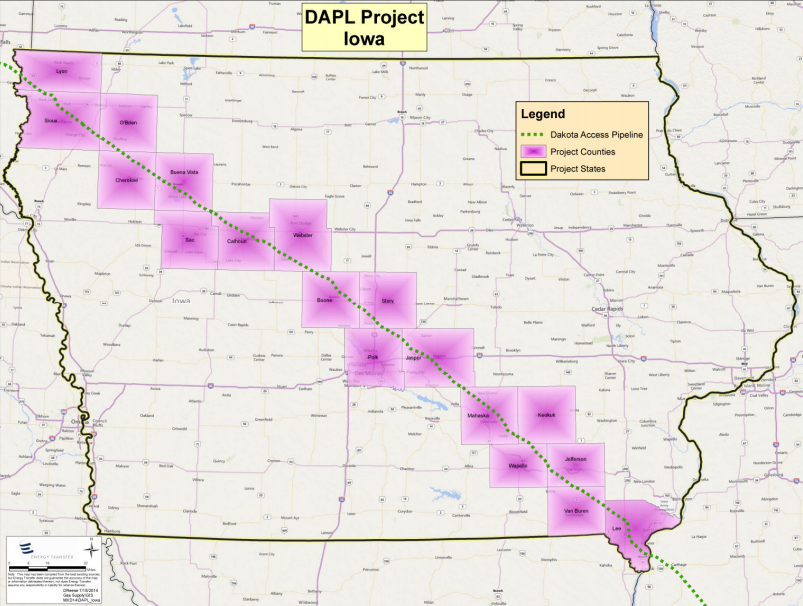Students don’t support pipeline project
September 23, 2015
Editor’s note: a former version of this story said the Bakken Pipeline would run through the north side of the ISU campus near the Research Park. This is incorrect. The proposed route is south of the campus crossing land in the area of the ISU Dairy Farm.
Bakken Pipeline Resistance Coalition held an informational meeting about the controversial pipeline at the Memorial Union on Tuesday night.
The event was hosted by the ISU Sustainable Agriculture Student Association, ActiveUs and the Community and Regional Planning Graduate Student Club. The meeting included background information about the project, how it will affect Iowans and what students can do to oppose the pipeline.
The Bakken pipeline, also known as the Dakota Access Pipeline Project, is a proposed project to transport oil from North Dakota to Illinois, the coalition said. The pipeline would affect 18 counties in Iowa, including Story County. Dakota Access, LLC, a subsidiary of Energy Transfer Partners, introduced this project in July 2014.
Phillips 66 has partnered with the Energy Transfer Partners to help fund the project that would include more than 1,000 miles of pipeline in order to transport nearly 18 million gallons of oil per day.
So what is all the fuss about? The coalition said they are concerned with the effect the pipeline will have on the environment, landowners and public safety.
The proposed pipeline will be 30 inches in diameter and will be buried 2 to 4 feet underground. The construction of the pipeline will require a 50-foot easement where no buildings or trees will be permitted. In addition, the coalition said Bakken crude oil has a lower flash point than other oils and poses a fire risk.
“The state of Iowa is being asked to take on the risk of a dangerous project for the gain of a private corporation,” said Ahna Kruzic, graduate student in sustainable agriculture and sociology.
The proposed route of the pipeline will cross the south side of Iowa State’s campus.
“As students who attend a land grant university,” said Kruzic, “…it’s critical that we understand the risks associated with the Bakken pipeline including those to our soil, environment, community and way of life.”
According to the coalition, the pipeline will also cross all the major watersheds in Iowa, posing the risk of contaminated drinking water. They said that landowners will be forced to comply with the Energy Transfer Partners plans or will be subjected to eminent domain—the practice of private property being seized by the government for public use.
Dan Gannon, a farmer with more than 200 acres in Jasper County, is one of the landowners whose property is sought after for the project.
“We have the right to protect our land and our families from this type of tyranny,” Gannon said, referring to the practice of eminent domain.
Gannon said Energy Transfer Partners does not care about Iowa; all they care about is money.
In addition to the potential effects the pipeline could have on Iowans, the coalition said the pipeline would also perpetuate America’s reliance on fossil fuels, which has been linked to climate change.
Stephen Biggs, assistant professor of philosophy and religious studies, said by supporting the pipeline, Iowans would be sending the message to investors that renewable resources are not the priority.
The coalition said oil spills are also a concern for Iowans; as Kruzic put it, “It’s not if [there will be a spill], it’s when.”
Rivka Fidel, graduate student in soil science, told the audience more than 90 percent of the land in Iowa is used for agriculture.
“Soil is not a renewable resource,” said Fidel. “Is this pipeline worth risking Iowa’s most valuable natural resource?”
The project, which is expected to be operational in 2016, will not have a justifiable impact on the Iowa economy, nor will it lead to energy independence, the coalition said.
According to the coalition, the pipeline will create 12 permanent jobs in Iowa. The group also said the oil from the pipeline will likely be exported to other countries.
The coalition has created a petition to stop construction of the project and has also created a link on their website to submit an objection to the Iowa Utilities Board. You can visit http://www.nobakken.com/wp/ to learn more about their cause or get involved.
















